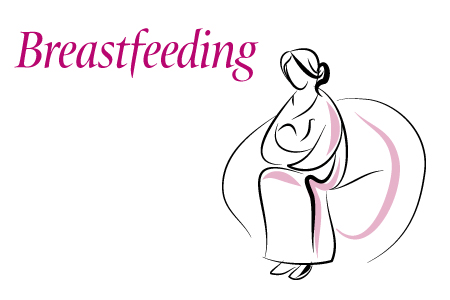
Breastfeeding Health Feature
Issue 71 August 2010
Breast milk is not only naturally designed to be a perfect formula for infants, but each mother’s breast milk is specifically tailored to the needs of her baby. Dr. Noreen A Kassem looks at the benefits of breastfeeding.
Mothers help to build their baby’s immune system even before birth and continue to do so almost immediately after birth by breastfeeding. The immune system of a newborn baby is underdeveloped and does not begin the production of most antibodies (immune cells that help identify and attack germs in the body) until the age of a few months. Only one type of antibody called immunoglobulin G (IgG) can cross the placenta from the mother into the baby’s blood while it is in the womb.
Other immune cells are passed from the mother to the baby only through breast milk. This is important for a healthy, developing immune system for a newborn baby because most pathogens (germs) will enter the baby through its mouth and nose and travel to the stomach and intestines. This is why babies are prone to diarrhoea and stomach upset.
So, what are the benefits of breastfeeding? Medical studies show that children who were breastfed as infants have stronger immune systems and suffer fewer allergy related illnesses such as asthma, eczema and hay fever. Breastfeeding also decreases the risk of milk and food allergies in babies and children. However, a baby can develop allergies to cow’s milk as early as a few days to months after birth. Breastfeeding alone for the first six to 12 months of life helps the baby avoid milk allergies from developing too early or at all.
Additionally, studies show that babies that were fed formula instead of breast milk have a higher risk of becoming overweight or obese and developing type I diabetes during their childhood or teen years. Adults who were not breast fed may also have an increased risk of becoming obese and developing type II diabetes. This may be due to the high protein, fat and sugar content of baby formulas that form the baby’s developing immune and digestive systems.
Breastfeeding Tips
It is recommended to begin breastfeeding immediately or soon after the birth. The baby will be hungry immediately after birth and some studies show that it has an innate, natural knowledge that the mother’s breast will provide food. Most newborn babies can be put to the breast within minutes of the birth, though the initial feedings may take an hour or more.
It has been suggested that a baby should be kept close to the mother and sleep in the same room. This allows the mother’s body to become naturally attuned to the baby’s cycles. Research shows that the mother’s body begins producing milk when it picks up subtle signals from the baby that it is hungry. Even before a baby begins crying, it is ready to feed and breathing patterns change and the baby may begin to stretch or move.
A newborn baby up to the age of six months does not require any nutrition other than breast milk, in most cases. For healthy breastfeeding, stay consistent and give the baby breast milk alone. Avoid supplementing with formula, water or sugar water unless there is a health reason to do so. Many companies that make formulas offer new mothers free samples of formulas because they are aware that a mother may turn to formulas for convenience.
Though in some cases, babies that are given breast milk in bottles will still latch onto the mother to breastfeed, some babies notice a difference in the rapid flow of milk from a bottle and refuse to latch onto a breast as there is more effort involved to get the milk. Thus it is better not to alternate.
Despite common misconception, studies show that it is actually easier for a premature baby to breastfeed than to feed from a bottle. In many cases, it may be safe to breastfeed a premature baby earlier than expected. Consult your doctor for more information about when it’s best to start breastfeeding a premature baby.
Health Benefits for Mothers
Breastfeeding mothers usually lose weight faster than mothers that do not breast feed and return to their pre-pregnancy weight earlier.
The uterus returns to its natural, un-stretched form faster in breastfeeding mothers.
Breastfeeding is good for emotional and mental health.
Breastfeeding mothers are at lower risk for postpartum depression and anxiety than mothers that do not breast feed.
Studies show that mothers who breastfeed their children, have a decreased risk of developing osteoporosis (weak, brittle bones) later in life.
Breastfeeding reduces the risk of cancers such as breast, ovarian and endometrial cancers.
The Myths of Breastfeeding
Myths and inaccurate knowledge about breastfeeding is often spread by formula advertisements and even by some healthcare professionals. It is important to do your research and uncover the truths about breastfeeding your baby.
Breast milk doesn’t contain enough vitamins and iron
Breast milk contains all the vitamins a baby needs, including vitamin D. There is also enough iron in breastmilk to last for at least the first six months after birth. Milk formulas actually contain too much iron, which is difficult for the baby’s body to absorb.
Baby formulas are almost the same as breast milk
Such claims have been made by advertisers for generations but formulas do not contain the immune cells, living cells, hormones or enzymes that are found in breast milk. Formulas contain too much protein and minerals than are needed for the baby.
Many women cannot produce enough milk
Most women produce more than enough milk. If the baby has difficulty feeding, it may be poorly latched onto the breast. This is particularly common in the first few days after the birth because the baby is learning how to latch on properly.
Breastfeeding hurts
Although new mothers may experience tenderness, especially at first, pain may be due to an infection of the nipples or the baby latching on poorly. The experience can be uncomfortable for first time mothers but it does get easier as the baby grows used to feeding.
Case Study
Anam, 32
My mother-in-law was totally against me breastfeeding because she wanted to feed the baby. My mother did not want me to breast feed because she was convinced that the baby would not put on weight. My husband wanted his wife back after 40 weeks of pregnancy and therefore did not want me to breast feed. It was against this totally unsupportive background that I fought to feed our first child myself.
The first six weeks were the worst. Our son would not latch on until a firm, but a very experienced midwife gripped my nipple really hard and basically shoved it into the baby’s mouth. He suddenly got the idea, and so did I. He fed constantly for those first few weeks. I felt like a milk machine. My breasts became engorged, my nipples became chapped and I got mastitis - which was agony.
With tube after tube of Kamillosan Ointment, I persevered because I was convinced that it was best for my baby’s immunity, long term physical health, and it would build my bond with the baby.
Eventually, after some months, I was able to express milk, so my mother-in-law was able to feed him. He put on weight and was strong, so my mother was calmed. And once the first six weeks were over I wasn’t feeding him all the time, so my husband began to relax. And as it quickly became apparent that the instant milk that breastfeeding provides soothed and calmed the baby, my husband became convinced and became an advocate to his family.
Four children later (including one set of twins), I have fed all of them for two years. I feel like I gave them the very best start in life physically and emotionally, and I feel like I received the best of rewards from God. Breastfeeding creates a wonderful bond and I would not have missed it, despite the initial very difficult start.
Bookmark this |
|
Add to DIGG |
|
Add to del.icio.us |
|
Stumble this |
|
Share on Facebook |
|
Share this |
|
Send to a Friend |
|
Link to this |
|
Printer Friendly |
|
Print in plain text |
|


Comments
0 Comments